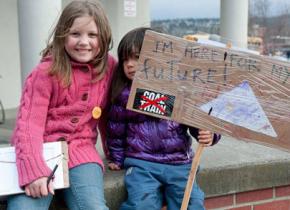Risks of their coal terminal
reports on opposition to Washington's planned Gateway Pacific Terminal--which activists say will harm both the environment and local residents' health.
MORE THAN 100 opponents of a proposed coal terminal to be located just north of Bellingham, Wash., at Cherry Point rallied at the federal courthouse on August 31.
The rally is part of an ongoing campaign that has enlisted workers, students, the unemployed and environmentalists in opposition to the Gateway Pacific Terminal (GPT). The campaign has won support across the region. People attended from Seattle, Everett and other parts of Western Washington. There was also a contingent from Occupy Spokane, more than 300 miles away.
After rallying at the courthouse, the demonstration marched to City Hall for another rally, after which many protestors briefly blocked the nearby train tracks while being photographed by railroad police. Over a dozen port opponents were arrested for a previous action blocking the tracks, but there were no arrests at this rally.
People around the region are concerned because of the potential impact that GPT would have on their health and the environment. Coal is the world's largest source of greenhouse gas emissions. The transport of coal will be a health hazard, releasing tons of coal dust across an area stretching from Montana to the Washington coast. If the terminal is built, 54 million metric tons of coal are expected to be exported yearly.

Proponents of the terminal are spending thousands on TV ads touting its environmental safeguards. They claim that the coal dust will be controlled by wetting it. Yet studies show that 80 percent of coal dust from trains drops out of the bottom of cars, and there is little if any way to limit this. The terminal developer, Carrix/SSA Marine, was caught in the summer of 2011--before environmental impact statements were completed--destroying wetlands to begin construction before getting required permits.
According to the environmental fact sheet "Facts about the proposed coal export from Cherry Point," the potential impact of the GPT include:
Threats to our health, clean air and water: Coal dust escaping from open coal trains and storage piles, and diesel exhaust from coal trains and cargo ships, would threaten human health, Whatcom County's clean air, and water quality in Puget Sound.
The wide-ranging health dangers of coal dust include exposure to toxic heavy metals such as lead, selenium and mercury. Coal dust leads to increased asthma, wheezing and coughing in children. Toxic pollution from diesel exhaust is linked to stunted lung development, increased probability of heart attacks, lung cancer, worsening asthma and infant mortality.
A comprehensive 2001 study of coal dust emissions in Canada found that the Westshore Terminal near Tsawassen, B.C., emits roughly 715 metric tons of coal dust a year. The report states that "coal terminals by their nature are active sources of fugitive dust." According to the rail operator, BNSF, every coal car can lose as much as 500 pounds of coal dust en route...
Exporting coal means more global warming pollution: Current plans call for as much as 50 million tons of coal to be shipped through Whatcom County annually to be burned in Asian coal plants. Burning that much more coal every year would produce more global warming pollution than all the cars in Oregon and Washington combined in one year.
Other potential effects of the GPT include disrupting an aquatic reserve at Cherry Point, snarling traffic at train crossings throughout the area, creating noise pollution from trains, and increased public expenditure on overpasses, bridges and other infrastructure needed just for this project. The public would be heavily subsidizing several profitable corporations by paying for this otherwise unneeded infrastructure.
THE COAL terminal is being pushed by both corporations and politicians. Besides Carrix/SSA Marine, Burlington Northern Santa Fe Railways (BNSF) would carry the coal. Peabody Energy is the world's largest private coal company and would make millions off of the Bellingham terminal.
Billionaire investor Warren Buffett's Berkshire Hathaway just bought BNSF. Goldman Sachs is partnering with Carrix on the project (apparently destroying the economy was not enough--now it wants to wreck the environment as well).
The terminal project is also heavily supported by politicians. Rob Murray, husband of Democratic Sen. Patty Murray, is employed by Carrix/SSA Marine. Other politicians endorsing the project include Democratic U.S. Rep. Rick Larsen and Democratic Washington Gov. Christine Gregoire, along with Republicans and local officials.
Unfortunately, labor is divided on the issue. A number of unions and labor groups, including the Maritime Trades Department of the AFL-CIO, the Washington State Labor Council, the International Longshore and Warehouse Union–Puget Sound District Council, among others, have endorsed the GPT, according to the project's website.
Their rationale is the 200 permanent union jobs the project is expected to create. Proponents claim that the construction of the terminal will create 2,000 temporary jobs as well. However, a study by an independent nonprofit agency, Community Wise Bellingham, claims that the negative impact on businesses in Bellingham, in the short- and long-term, would destroy as many jobs as the terminal creates.
It's understandable why labor would support any project that seems to offer jobs in the current economic climate. But unions can't ignore the warnings that this project represents a real threat to the health of our community and the environment--including their members. These things can't be sacrificed for corporate profits in return for the promise of jobs.
It's important for unions to work with the community--and vice versa--as part of a movement to demand not only environmental protections, but the creation of permanent "green jobs."
The organizing will continue after this rally. Activists intend to continuing rallying, educating the public and doing everything they can to stop the terminal--including joining forces with other grassroots groups near the rail lines that are scheduled to bring the coal to the port.
From the movement against hydraulic fracking to the opposition to the Keystone XL oil pipeline, opposition is mounting against those who wish to destroy our environment for the sake of profits.


